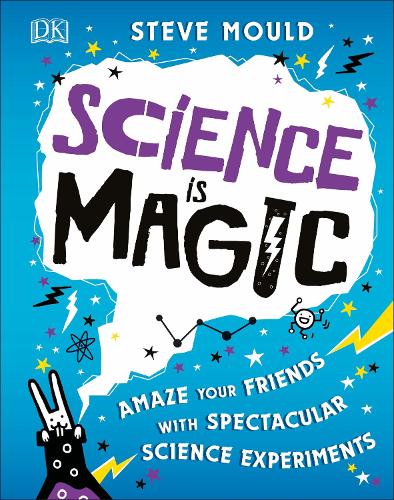
Science is Magic: Amaze your Friends with Spectacular Science Experiments
(Hardback)
Publishing Details
Science is Magic: Amaze your Friends with Spectacular Science Experiments
By (Author) Steve Mould
Dorling Kindersley Ltd
DK Children
19th March 2019
7th March 2019
United Kingdom
Classifications
Children
Non Fiction
507.8
Physical Properties
Hardback
96
Width 223mm, Height 283mm, Spine 12mm
641g
Description
Amaze your friends with spectacular science experiments Learn how to perform magic tricks and illusions using simple science experiments in this children's activity book for kids aged 7-9. Join science presenter Steve Mould, #1 bestselling author of How to be a Scientist, to find out the secrets behind amazing magic tricks. Learn how to bend water with a balloon, make a glass beaker disappear in oil, and wow your friends with levitating tinsel! Each magic trick is explained using step-by-step photography, with the science behind each one described clearly and simply. Plus, interspersed throughout the book you'll find out how legendary magicians and illusionists, such as Harry Houdini, used science when performing their most famous tricks. Kids will love impressing their friends and families with simple magic tricks that teach them valuable science lessons at the same time. Packed with optical illusions and fun facts - Science is Magic is a must for any wannabe scientist or magician.
Reviews
Mould, who has penned a raft of well-loved titles, such as How to Be A Scientist and The
Bacteria Book, has once again pulled off one of the best tricks of all - making science fun
and easily accessible.
A unique insight into how 'magic' tricks work, and the scientific explanations and step by step guides are well written and clear. There's loads of content and activities to try; a firm favourite in the CS Reading Corner! * Creative Steps *
Contained within these pages is an assortment of kid-friendly tricks guaranteed to make you
rub your eyes in wonder.
Science is Magic has the perfect balance of try-at-home tricks and science explainers, looking at the weird and wonderful in nature and the science behind some of the best known illusions. * Woman's Way *
Author Bio
Steve Mould is a science presenter and comedian with a physics degree from the University of Oxford. He appears as the science expert on British television shows such as The One Show, Blue Peter, and The Alan Titchmarsh Show. He has a YouTube channel with more than 138,000 subscribers, and his videos regularly achieve hits in the hundreds of thousands. One of these videos (about "self siphoning beads") went viral worldwide, gaining more than 1.7 million hits and being mentioned in the New York Times and on the BBC. Scientists later discovered why it performed in the mysterious way it did and dubbed it "The Mould Effect". In addition to this he presents a radio show on BBC Radio 4 and is part of a live comedy/science trio called Festival of the Spoken Nerd who performs at festivals and events.
